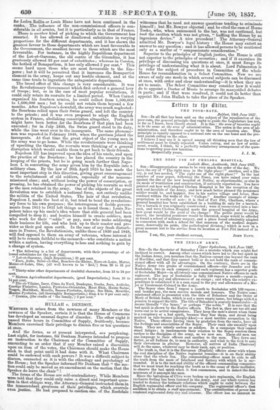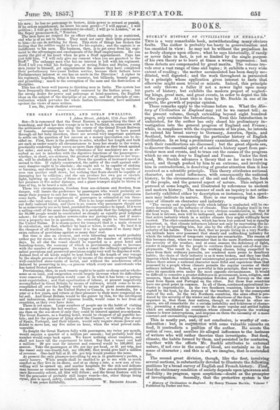THE INDIAN ARMY, Upper Sydenham, 14th June 1807. SIR—lo the
Spectator of Saturday I see a mistake which you might feel inclined to correct. Among other causes which have led to the bad spirit in the Indian Army, you mention that the Natives cannot rise beyond the rank of Havildar, and that they cannot hold or do not hold the rank of commissioned officer with all its advantages. On the contrary, there are in the Native Army two grades of commissioned officers—the Jemadar and the Soobahdar, two in each company ; and each regiment has a superior grade of Soobahdar Major—in all twenty-one commissioned Native officers in each regiment. The pay of Soobahdar is fully 150 rupees a month—equal in amount to the pay and allowances of an ensign ; and when the relative expenditure is considered it is a sum equal to the pay and allowances of a Major or Lieutenant-Colonel in the Army. The Sepoy rises from 7 rupees a month to Soobahdar with 160 rupees ; and besi.s pay, the men receive medals and honours. The Native commissioned officer is presented with the title of Bahadoor and the Order of Merit of British India, which is not a mere empty name, but brings with it a pension to support the title. The title of Bahadoor is scarcely translatable—it means literally "the brave," or perhaps" the noble." It is rare that the bad spirit is shown by the Native officers. The fact is, they are too old and worn-out to be active conspirators. They keep the men's secret when there is a conspiracy or a, bad spirit, because they fear them, and dread being marked as tale-bearers (eltoogly-khor)—a most terrible accusation to the Native. These officers having risen by gradation from the ranks, have all the feelings and associations of the Sepoy. Their rank site uneasily upon them. They are utterly useless as soldiers. In a campaign they cannot stand fatigue ,• in cantonments their relation to the Sepoy renders them useless to the discipline of the army, as we now see. These old men use . one language to their officers and another to the men. They fawn and flatter, as all Indians do, to men in authority, and wink to the men to note their cleverness in glozing. However, all natives of India (Easterns) will do the same, whatever may be their rank, age, or position. The truth is, that it is the European (English) officers alone with whom the real discipline of the Native regiment remains—it is on their ability alone that the whole lies. The commanding-officer must be able to sift the truth from the mass of falsehood and flattery with which he is surrounded. It is to the tact and ability of the officers commanding companies that we must trust for reaching the truth as to the cause of these mutinies, to observe the bad spirit when it first commences, and to detect the first murmurs of it amongst the men. Since the battalions of Clive were broken up into regiments, the 'English exclusive feeling has been fostered in the Army, and our whole system has tended to destroy the intimate relations which ought to exist between the English regimental officer and his company. The regimental officer's first ambition is to obtain a staff appointment. The centralization of power has rendered regimental duty dry and irksome. The officer has no interest in
his men ; he has no patronage to bestow, little power to reward or punish. If he orders punishment, he hears his men growl—" I will appeal; I will petition ; I will go to the commander-in-chief; I will go to London," or as the Sepoy pronounces it, " Nundun." The men have no respect for an officer whose authority is so restricted, and who is of no use to them. They need not carry their little grievances to him—he can do nothing for them. This state of things has broken the feeling that the soldier ought to have for his captain; and the captain is as indifferent to his men. His business, then, is to get away from his regiment to the advantages and emoluments of the Staff employments. He can marry the girl of his heart when he gets a Staff appointment. Papa has just told him, " I will only give my consent when you are gazetted to the Staff." The unhappy man who has no interest is left with his regiment. Need I tell you what his feelings are, at seeing Nokes and Styles, young men junior to himself, get appointments the minute they have completed their probationary two-years Indian service, because their fathers have Parliamentary interest or one has an uncle in the Direction ! A cipher in his regiment, hopeless, what is his resource, but billiards, brandy panee, and grumbling; much to the corruption of the men and the destruction of discipline.
This has all been well known to thinking men in India. The system has been frequently discussed, and loudly censured by the Indian press ; but the strong desire for power and patronage at head-quarters, the English ideas on the subject of the discipline of an army, and the principle of centralization which pervades the whole Indian Government, have militated against the views of mere writers. I am, Sir, your obedient servant. S.



























 Previous page
Previous page